Story highlights
The Taliban has tried to kill Fawzia Koofi, an outspoken women's rights advocate
She grew up in a remote area of Afghanistan, but has twice been elected to Parliament
Koofi is campaigning to be Afghanistan's next president in an election slated for 2014
Her stress relief from a dangerous job? Her young daughters
The mother with an important but dangerous job sat down to write a goodbye letter to her two young daughters. Just in case, she thought. The Taliban could get lucky this time and finally kill her.
Fawzia Koofi, who is campaigning for the presidency of Afghanistan, began by writing this to her 10- and 12-year-old.
“Today I am going on political business to Faizabad and Darwaz. I hope I will come back soon and see you again, but I have to say that perhaps I will not.”
If she didn’t come home, she wrote little Shuhra and Shaharzad, they should take their mother’s advice on how to get on without her.
“First,” she wrote, “don’t forget me.”
Finish school, live independently, stay with your aunt, study abroad. All the money their mother has in the bank, it’s all theirs. Spend it wisely, on school.
“A girl needs an education if she is to excel in this man’s world.”
Explore the world. Be brave. Make your country a better place.
“All of us human beings will die one day,” Koofi wrote. “Maybe today is the day I will die. But if I do, please know that it was for a purpose.”
Despite her security detail receiving a message that the Taliban had planted a bomb under her car, she went, and made it back home safely. This is Koofi, someone who believes without question, even since childhood, that purpose has always guided her. Luck was just something that always showed up when she needed it.
She had come from a place where nothing was expected of a woman to being the first female elected to Afghanistan’s Parliament, a body reformed after the war. Every outing was a risk.
An episode in 2010 proved that. As Koofi’s convoy traveled near Kabul, shots were fired at cars carrying her, her daughters and sister. Her security fired back. It was a chaotic nightmare, but they made it out alive.
The close call with death is one of many detailed in her new memoir “The Favored Daughter,” released as buzz began building about her campaign to become President Hamid Karzai’s successor.
The country’s presidential election is slated for 2014. Under the latest timetable, all U.S. troops are supposed to be gone from the country then.
Shuhra and Shaharzad were so young back then. They were too young to remember like their mother does an Afghanistan that, under Taliban rule, forbade girls to go to school and sanctioned the murder of women perceived to have shamed their male relatives. Her girls will only hear of the days when the Taliban ordered homeowners in some parts of Afghanistan to darken their windows so the women inside could not be seen.
“My daughters always feel that I am very exceptional in Afghanistan,” Koofi said last weekend near Kabul.
It was bright out, and she squinted into the sun. Her face lit up when she talked about her daughters. She seemed relaxed and warm, perhaps an unexpected state for a woman who receives constant death threats and changes her phone number all the time. The pressure does get to her, though.
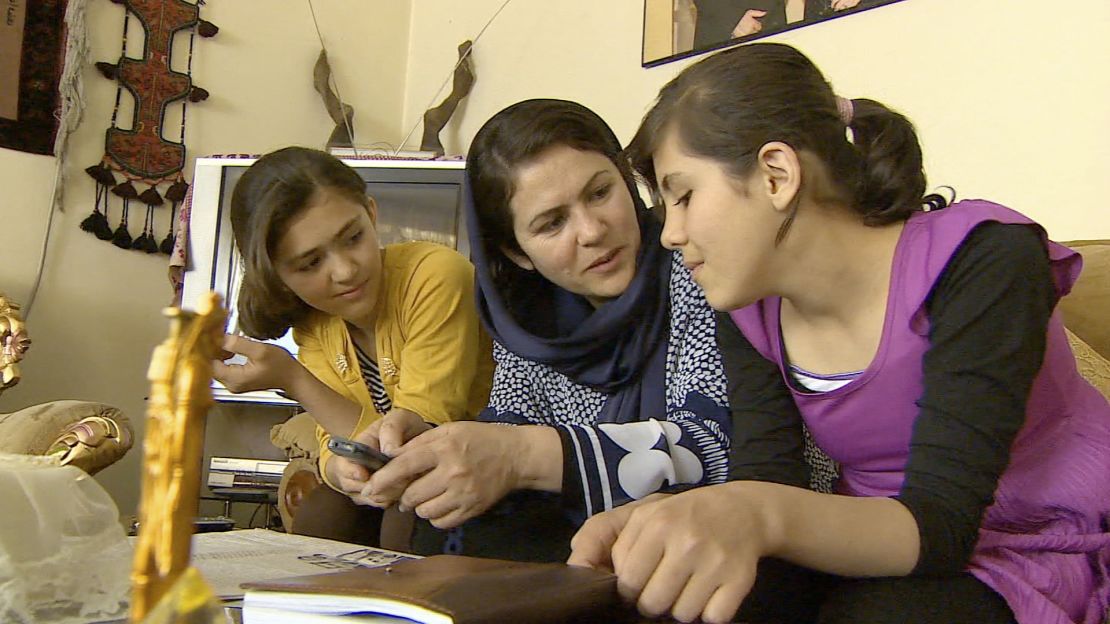
“It’s a very difficult life for a woman, to be a woman alone in Afghanistan, to be a mother, to be a single mother and to be a woman politician,” she said, adjusting her navy headscarf when the breeze catches it.
She still laughs as she said in fluent English, “I get overwhelmed. I get overwhelmed 10 times a day.”
When that happens, she take a few minutes to be alone. And then she turns to her children.
“I forget everything when I’m with my daughters and we watch TV or watch the news.”
She’ll sit with them as they message their friends on Facebook.
“Sometimes they are proud of me, and especially when I go to foreign countries,” Koofi said. “I tell them that if I don’t go, there is no money, so I have to go and raise money for schools for other girls.”
Shuhra and Shaharzad like to tell their classmates, “My mother builds schools,” she said.
But there are also some mornings when one of her girls will tug at her arm.
“My elder daughter is protective, like a grandmother,” Koofi said. “She doesn’t want me to go out of the house.”
“The younger one is realistic. She said, ‘Even if a woman becomes president in Afghanistan, it might be difficult to rule Afghanistan.”
The woman who defied Saudi’s driving ban and put it on YouTube
Defying death
“Even the day I was born, I was supposed to die.”
That’s how Koofi explains her first 24 hours.
She was born in 1975 in the remote and wild northeastern province of Badakhshan, near the border of Tajikistan and China.
Koofi was the 19th child out of her father’s 23 children.
Her mother was her father’s second wife. Koofi writes in her memoir that she saw him beat her mother badly, tearing out chunks of her hair.
But Koofi’s mother loved him. This was the way in Afghanistan. Her mother was dignified, strong, yet at the same time she believed that women obeyed their husbands. When wives failed to please their husbands, they had earned a beating.
While her mother was pregnant with Koofi, her father took a seventh wife, a 14-year-old. That depressed her mother terribly, and her pregnancy was troubled. She was pale, sick and exhausted, Koofi wrote.
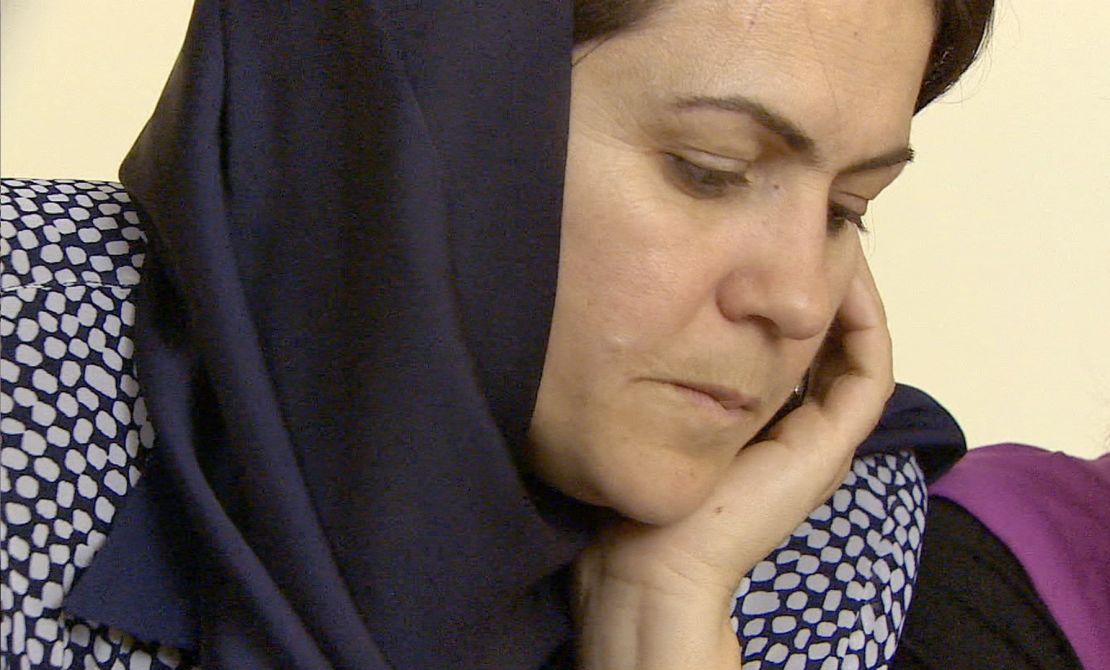
Her mother prayed she would give birth to a boy.
After a 30-hour labor in a countryside shack, and falling semi-conscious, someone told Koofi’s mother disappointing news.
The woman turned away from her newborn and refused to hold her child.
“No one cared if the new girl lived, so while they focused on saving my mother, I was wrapped in cloth and placed in the baking sun,” Koofi wrote.
After nearly a day left alone, screaming, and her parents believing that “nature would take its course” and she would die, someone went outside and brought the baby indoors.
Koofi writes that her mother’s instincts to love her kicked in. From then and throughout her early life, Koofi and her mother forged a bond built from surviving circumstances that would probably break most people.
Even today, talking with CNN, when Koofi is asked what her mother would think about her running for president, she has no harsh feelings.
In fact, she reveres both her mother and her father, who became involved in politics and was killed by Afghan fighters when she was 3.
She speaks lovingly about her mother, who died years later.
“My mother always [regarded me] as a special person in her life,” Koofi said. “She will always tell me one day you will become something.
“She never told me what that something means for her,” Koofi said. “She would be proud, I’m sure. If my mother was alive, my life would be different in a good way because my mother was a big supporter of me.”
She included a letter in her memoir to her late mother.
“I’m a politician now. But sometimes I’m just a silly girl and I make mistakes,” Koofi wrote. “When I do make a mistake, I imagine you’ll be there, gently chiding me and correcting me.”
Mideast women beat men in education, lose out at work
A teenager under the Taliban
Koofi laughs as she recalls how she was determined to go to her English classes when she was a girl, before the Taliban took control and prohibited girls from getting an education.
When Koofi was 11, her mother had moved the children to Kabul, where one of her brothers got a job as a police officer.
Even during Afghanistan’s civil war, Koofi would set out from her family’s home to school despite the violence.
“You could see rockets coming from different parts of Kabul, but I could still go,” she said.
Her brothers taunted her unrelentingly. Girls weren’t supposed to learn, they said. And her mother was scared she would get hurt. “She would tell me, ‘If this English class makes you president, I don’t want you to be president, I want you to be alive.’”
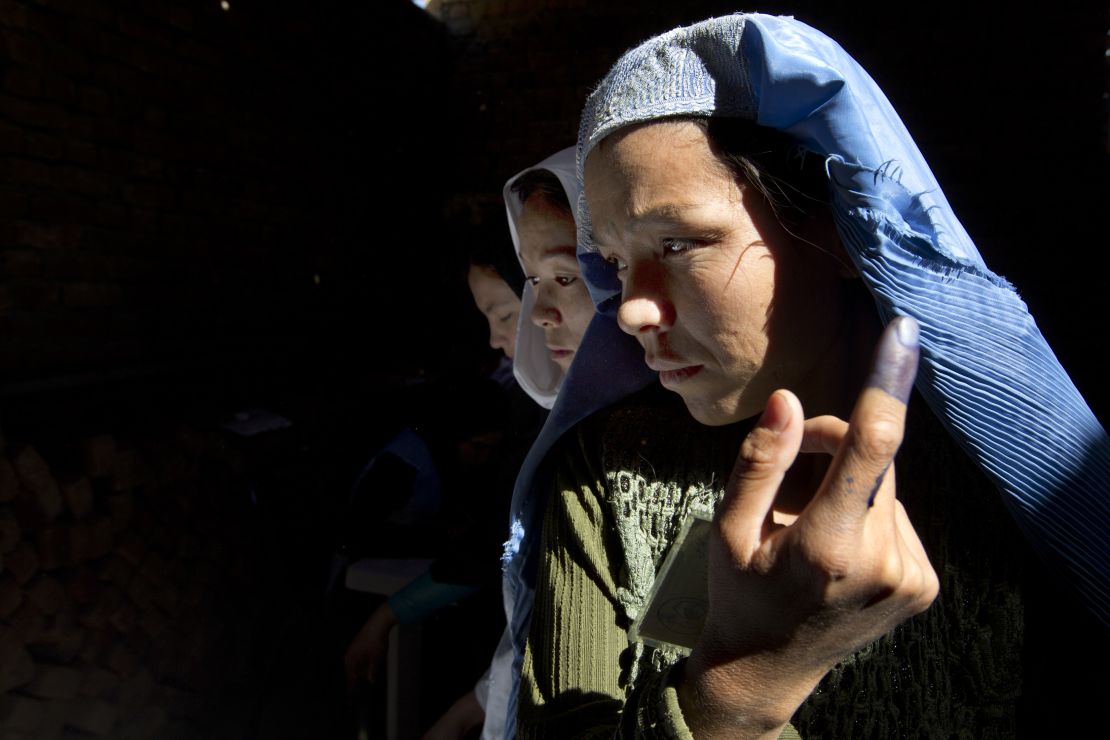
Kabul introduced Koofi to modernism. She saw women wearing nail polish and makeup. Some of her friends had swimming pools. She talked about poetry and literature with her friends.
Her life was largely peaceful and fun, she writes, until 1989 when the same rebel fighters who killed her father, the Mujahedeen, were declared the new government. Afghans were still optimistic. The Russians were gone, retreating after years in a war they couldn’t win.
Afghanistan was changing, and in ways that a 16-year-old girl who was once free to express herself didn’t like. With so many male soldiers around, it seemed smart to her family to make Koofi cover herself with a burqa. It was oppressively hot, first of all, young Koofi thought. And what was the point of getting to wear makeup and look pretty when she went to parties? She recalls seeing glamorously dressed female news anchors taken off the air and replaced by “dowdy women in scarves.” She was scared about where the country was heading, and went to her mother, who sent her daughter to another city to go to school.
Soon, though, the changes in her life got much more serious.
One of her brothers who she was especially close to was killed, shot to death in his home. Koofi writes in her memoir that the killing is still a mystery, and the family got little help in solving the crime. The country had become so unstable by this time that justice was in short supply for everyone.
As a Muslim, she writes in her memoir, she believes God decides everyone’s fate. “He chooses when we live and when we die. But even that certainty doesn’t make the painful events and losses of my life easier to bear.”
One of those heartbreaks came when the man she married was imprisoned by the Taliban shortly after their wedding. He was punished because Taliban leader Mullah Omar wanted to get back at one of her brothers, she writes. Koofi’s husband was taken into custody a week after they wed.
Koofi’s husband was freed and then arrested again. She fought for his freedom, and eventually he was released. But it was too late. He had caught tuberculosis from other prisoners. He lived long enough to see his daughters become adventurous girls who loved to play and dance. But he had to keep his distance, especially when the coughing fits shook him.
In his hospital room, Shuhra and Shaharzad came in dressed up like gypsies and sang silly songs. They asked if they could give him a kiss. He refused, too afraid he would infect them.
Koofi’s husband died later that night.
Indian father accused of killing baby ‘for being a girl’
Taking the burqa off
When the Taliban came to Kabul, Koofi was in college. At the time, she only vaguely knew who they were, or how they were different from the Mujahedeen.
“In my view, they were all just men with guns,” she remembered.
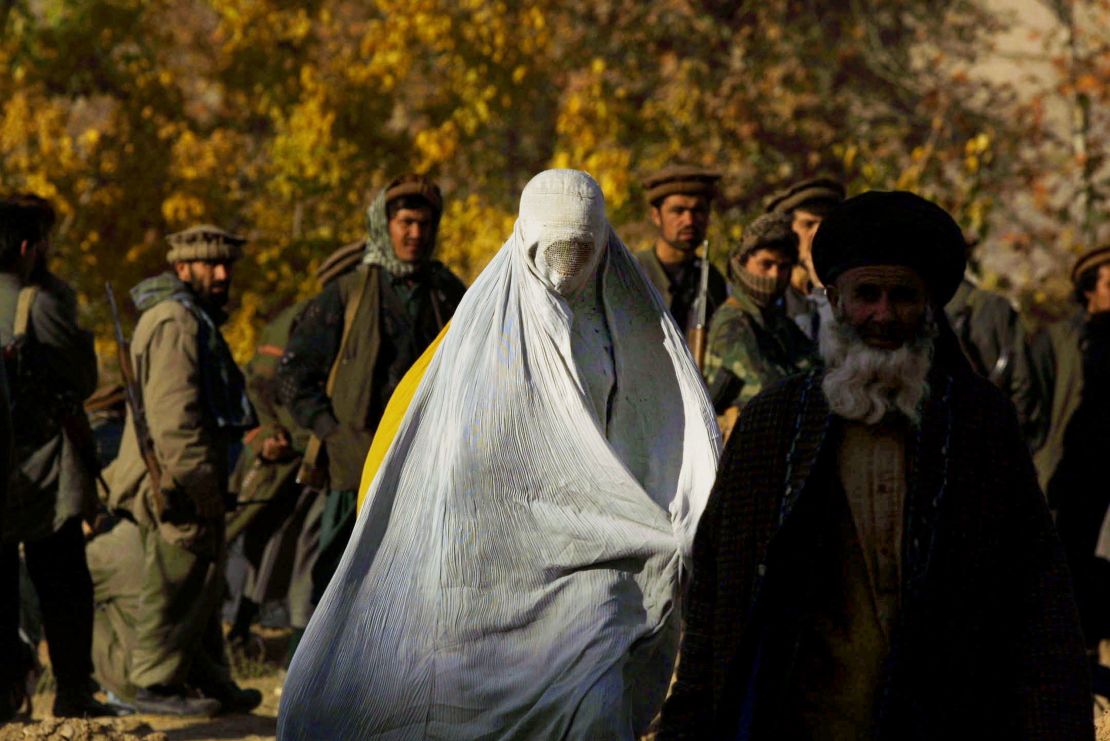
Soon, the Taliban blasted statues with rocket-propelled grenades and heavy artillery until they fell. “Then they started destroying our minds,” she writes, burning schools, books and banning literature.
In short order, girls could go nowhere. They were terrified of being accused of “morality crimes” and dragged to the Taliban’s Ministry of Vice and Virtue.
Those were bleak years.
But there are bright moments. She had her daughters, and she had started to work for the United Nations Children’s Fund, venturing out into the countryside and talking with those who had the worst possible lot under the Taliban.
In the frenetic atmosphere in Afghanistan after the September 11 attacks, she said, for the first time, some of her male counterparts began focusing more on the work they had to do, and how to do it better, than whether she needed to wear a burqa.
Before then, she said, “I never attended a meeting with government officials [without wearing one],” she said.
She was suddenly thrust in the position of initiating school openings for girls. She had to organize vaccine supplies for the children. In her memoir, she writes that a governor who was in meetings with her urged her to take off her burqa. They needed to see her face, he said, to communicate with her.
“They respected me for what I did,” she recalled.
She ached from the loss of her husband and decided she couldn’t remarry. She could, however, marry politics. When parliamentary elections were announced, and women were allowed to run, her relatives debated the idea that she put her name on the ballot.
She reasoned that she had solid networks from her United Nations work, and she had outreach and support in far-flung displacement camps and villages. Her family name still carried some political weight. She went for it, campaigning as she does today, without wearing a burqa.
The Taliban’s ‘conditions’ for women
Koofi believes that in the years since her win in 2005 to her current campaign, life for women in Afghanistan has improved to a degree. There are statistics and reports that support this. In 2004, girls were formally guaranteed a right to an education under the Afghan constitution. Human Rights Watch reported in 2010 that nearly 2 million Afghan girls were enrolled in school (though only a small number advance past elementary school, rights groups have reported).
Literacy rates are up for girls between 12 and 16, according to a 2011 Oxfam report. Across Afghanistan, infant mortality rates have dropped and life expectancy has risen, according to Unicef. Women who once had to quit their jobs have gone back to work as doctors, lawyers and police officers, Oxfam reports.
But stories of honor killings, poisoned wells at schools for girls and attacks that disfigure women persist. Human Rights Watch reported in March that women are still being targeted for committing “moral crimes” like sex outside marriage or running away from home.
Koofi said she fears what will happen if the Taliban regains their political footing as a result of ongoing negotiation with the United States intended to stabilize the country.
“You know that [the] Taliban have three conditions – one of those conditions is women’s Islamic rights. I know what that means – Islamic rights of women. …” she said. “They deprive women from all rights, including the right to [an] education.”
The Taliban must change “some of its core principles” and agree that girls can go to school, work and be involved in politics. If they “come back with the same mentality,” Koofi said, “this will be a huge step back for all women, for all citizens.”
“Our daughters are like the hope, the future of Afghanistan,” she said. “I think women have to stand up, they have to raise their voice, demonstrate that they have equal abilities in this country like many other people have.”
Taking chances
Her first day in her new job as a lawmaker was the first time Koofi had been inside Afghanistan’s parliament building. On her second day, she put her name in for deputy speaker. She knew her chances were slim. Several male members of Parliament practically sneered at her. It was an audacious move. But she made it because she was emboldened by her then 6-year-old daughter, Shuhra.
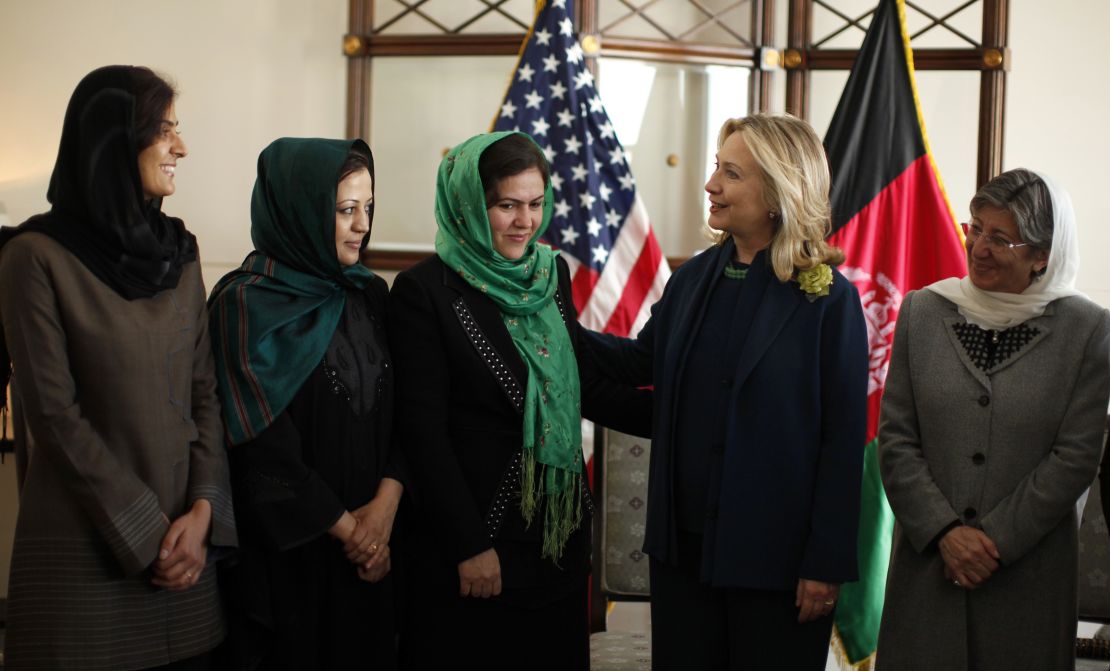
Do you think I should try? Koofi asked her.
The little girl promised she’d gather 100 schoolchildren and come down to Parliament and wave flags so that her mom would win.
Days later, Koofi was elected deputy speaker.
It was an international news event. She felt fantastic, but also like a novelty. She was besieged by expectations. Journalists descended on her. How was she going to fix Afghanistan?
She started with victories that would seem small in the United States but huge in Afghanistan – getting funding to build a highway, raising awareness about getting girls in school and pushing for women in higher education. She has met with international heavyweights like former Secretary of State Condoleezza Rice and, now in her second parliamentary term, Koofi talked with U.S. Secretary of State Hillary Clinton. She has received praise internationally for championing women’s rights, and spoken at the World Economic Forum.
Yet, could she really win the presidency in Afghanistan, beating the United States at electing a woman as its top leader?
She laughs.
“I don’t think any candidate will actually run to lose. I don’t run to lose.”
“Leaders in Afghanistan, once they get elected they don’t go back to their community and ask about social problems,” she said. “I did. That gives me confidence, esteem, that people will not compare me with other candidates.”
She’s sure that villagers in provinces who she worked with during her Unicef days will remember her and support her campaign, she said.
When asked if she has any regrets, she pauses. She could have done more in that job, she said.
“I could have mobilized more donors to establish more girls schools in my village or other villages in Badakhshan.”
The girls who attended schools she did open have always been her biggest supporters, like her daughters.
But there’s never enough time to do everything she wants, she said. And the pressure on her can come down hard, too much, sometimes.
Shuhra and Shaharzad, in those moments, are her peace.
“When I am alone, they fill the gap.”
Saving Face: The struggle and survival of Afghan women
CNN’s Mohammed Jamjoom and Ingrid Formanek contributed to this report.



